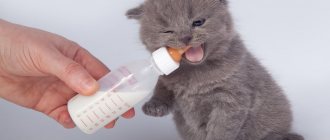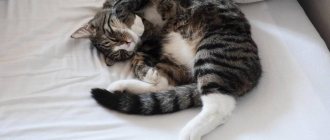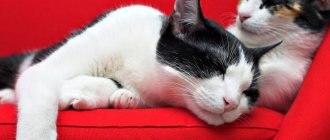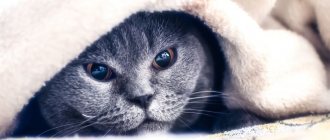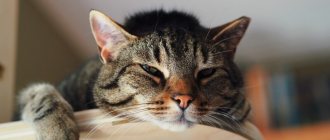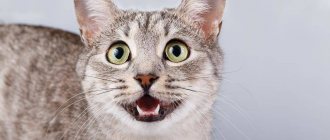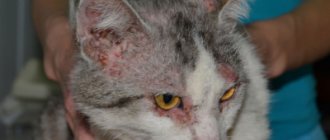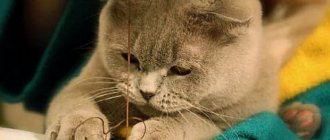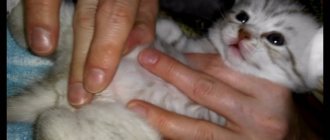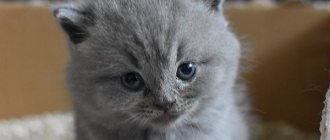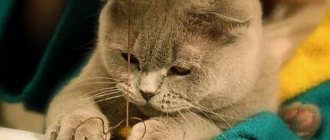Signs for guests
What does a cat do:
- washes right in front of the front door or on the threshold - expect guests soon (if you touch a cat’s paws, you can find out how desirable these people are to you: a warm pillow speaks of friends, a cold one speaks of those you don’t really want to see).
- carefully and for a long time washes the entire face (nose, ears, eyes, “cheeks”) on the right side - expect a man, on the left - a woman;
- licks itself defiantly in a visible place when the family sits down for breakfast - an occasion to show hospitality will soon arise, leave some kind of treat in the refrigerator in reserve.
Japanese traders have a sign: a cat washes its ear with its left paw - buyers will arrive.
Places with negative energy
Psychics believe that cat washing indicates an unfavorable place in the apartment. It is logical that the animal feels discomfort, is nervous and therefore begins to lick itself thoroughly.
If a pet often washes itself on the owner’s bed, it is not positioned correctly or negative energy comes from the person himself. Usually this indicates illness, but sometimes it can predict other troubles. If this is a marital bed, there may be discord between husband and wife.
It is useful to notice in whose room the cat washes itself most often. If this is a common room, the problems concern the person who sits here more than others. If your pet licks itself in the kitchen, avoid unnecessary spending and follow a saving regime, as your financial situation may worsen.
If the cat settles down for washing in a corner, there is a tense atmosphere in the house (possibly related to troubles at work).
Signs
- If a pet restlessly licks its tail and nearby areas of the body, this indicates the approach of sorrows and/or unfavorable weather (blizzards, rains).
- A cat washing its hair with its paw hints at warm, fine days.
- If your pet, while at home, fussily begins to wash itself, guests will certainly come to visit you in the near future.
- If a cat washes the area behind the right ear, this means a man will appear, and behind the left ear, this means an acquaintance with a woman.
- Even the temperature of the paws of a cat washing itself can play a role: if they are hot at the tips, then welcome guests will certainly come, and if they are cold, unwanted people will come.
- The Romans believed that if our smaller brothers were “scratching behind their ears,” we should expect cold weather and snow.
- The Serbs noticed that during the washing process the cats turned their bodies against the direction of the wind.
- Slavic families believed that a cat licking its own fur near the door indicated the imminent arrival of a priest.
- Since ancient times, Japanese merchants have been confident that cats carefully “combing” their ears with their left paw indicate an approaching influx of buyers.
Folk signs about a cat washing itself
There are many signs associated with washing a cat:
- If a cat washes its back and tail, there will be rain and bad weather, cheeks and nose - to clear and sunny weather.
- When a cat rubs its face with both paws, you need to track which direction it turns its head, since it is from there that the strong wind will soon come.
- If a pet washes its left ear, a woman will soon come to visit, and the right ear, a man will come to the house. The cat’s paws at this moment are warm - relatives will come, cold - to unexpected visitors.
Source
The main reasons for washing your face
Pet owners have noticed more than once that cats devote all their free time from playing and sleeping to washing themselves. This natural cleanliness is explained by many reasons:
- Genetic memory. The first and main reason for frequent washing lies in the instinct received from wild ancestors. Even the most domesticated cats are predators, distinguished by their ability to ambush their prey for hours. To prevent the potential prey from smelling the hunter’s natural scent and running away, the cat licks its fur every half hour.
- Personal hygiene. Cats are big clean people. They clean their faces with their front paws after finishing eating, after visiting the tray, and wash themselves multiple times every day, removing stuck debris and other dirt from their fur. In addition, they cannot tolerate foreign odors on themselves and, after being petted, prefer to tidy up their fur coat.
- Thermoregulation and creation of a moisture-repellent layer on wool. With the help of frequent licking, animals stimulate the glands located at the base of the hair follicles, which secrete an oily secretion - sebum. This protects the wool from moisture and sudden temperature changes in the environment. In winter, with the help of special laying of fur with the tongue, cats warm up, and in summer they protect themselves from overheating by increasing the space between the hairs to open air access to the skin.
- Molting process. During this process, not all dead hairs may fall out on their own, so pets comb them out with their tongue.
- Relief from stress. Owners have noticed more than once that in a state of fear and in stressful situations, furry pets begin to actively wash themselves. There is a simple explanation for this. This is how they calm themselves down. The licking process works like a relaxing massage. In addition, during stress, the animal’s body temperature rises. Treating the fur with your tongue helps to reduce it.
- Expression of social activity. Cats almost always get along well with other pets. By licking them, they express their love and affection.
Why do cats wash?
There are several factors that contribute to this. So that these cute animals take such careful care of themselves. So, let's try to consider the most important of them.
- When a cat begins to lick itself, it seems to stimulate its fur, thereby disturbing the glands. During this procedure, they secrete a special oil secretion. Oil is known to protect fur from moisture; with the help of licking movements, cats distribute it evenly throughout the body. Moreover, if a cat spends a lot of time under the sun, this secretion turns into vitamin D. This procedure helps protect its beautiful fur and enrich its body with useful vitamins.
- From a cosmetic point of view, as well as from a hygienic point of view, the washing procedure helps to ensure proper care of the coat. As you know, cats are susceptible to infection by various parasites. By washing and licking, they fluff up their fur, without providing a breeding ground. Dirt and dead hair are also perfectly removed by washing. Clean cats are much less likely to acquire parasites such as fleas and ticks. The washing procedure does not leave them any opportunity to live comfortably on the animal’s fur.
- As you know, the body of most cats is covered with dense fur, unlike some breeds. The function that wool performs can be compared to a thermostat. So, for example, in hot weather it protects from the heat, and in cold weather, on the contrary, it warms the animal. The fur itself has something like a layer, which helps cats control their body temperature. When the washing procedure occurs, the animal tries to lay its fur in the desired direction. Thereby choosing the required temperature. In hot weather, animals also use washing to cool their bodies. Since the sweat glands are located only on the tips of their paws, this is not enough for cooling.
- Another reason for cats to wash is to convey warm feelings to each other. From an early age you can notice this touching and funny procedure when they begin to lick each other. If a mother cat is very caring, then over time she will teach her offspring cleanliness and self-care. If several cats with a friendly character live in the same apartment or house, then mutual washing often occurs. By doing this they show their love and devotion to each other. You can also notice the following picture: some good-natured cats can lick the hands or face of their owner, also expressing their feelings for him.
- After suffering stress, cats also involuntarily begin to wash themselves. This can happen out of fear. Changes in situation or simply resentment towards your owner. They take a kind of neutral position, showing their indifference to everything that happens. Often cats divide their territories, and this does not happen without a fight. Having received certain wounds, they calm down and begin to lick them; their saliva contains a special liquid that promotes rapid healing.
Where did the belief come from?
Cats are very sensitive to climate change - this is where weather signs come from.
It is not yet known exactly how, but cats anticipate the appearance of people in the house. According to esotericists, they see how energy is changing. There is no exact explanation, but many know from experience how a pet sits at the front door shortly before the return of a beloved family member.
It is believed that the arrival of guests is known to cats in advance. Strangers are stressful for animals and they try to “calm their nerves” by thoroughly washing themselves.
The ritual of licking is a means of self-soothing
The cat washes itself because it wants to calm down. These animals have a flexible psyche. They can be upset by things like traveling in a car, visiting a veterinary hospital, moving to another room, or having another pet in the house. The sensations they experience when a rough tongue touches their body are similar to what people experience during a relaxing massage.
While washing, the animal concentrates. It can devote a lot of time to this process. So that no one disturbs the pet and does not interrupt it from relaxation, it tries to choose a secluded place for self-massage. Do not disturb your pet while it is washing itself.
Cats are not always able to cope with stress on their own. In case of severe emotional shock, massage alone is not enough; the use of sedatives is required.
Reasons for cat cleanliness
All owners of mustachioed tabbies often watch how their pets tidy up their fluffy coat. Why do they do this so often and so carefully?
- The most basic reason for such diligent self-care lies in the deeply ingrained habit of getting rid of all foreign odors that might indicate the presence of a predator during the hunt. This is what the wild ancestors of the modern cat tribe did, so genetic memory retains the habit of cleanliness, even if there is no need to get food from an indoor creature.
- Another important reason for increased neatness is the stimulation of special glands that secrete a substance that protects the coat from getting wet.
- By licking its fur, the cat changes the thickness of the air layer between its surface and the skin. This method helps the animal achieve better cooling of the body in hot weather or additional warmth in cold weather.
- Licking yourself or another cat often serves as a demonstration of friendly feelings, sympathy and good humor. This behavior is a unique form of communication between animals and each other, a manifestation of their social connections.
- Scientists have identified another purpose of cat hygiene – stress relief. Methodical, repetitive movements allow a cat to relax and calm down when she is experiencing separation from her beloved owner, a serious illness, or other situations that cause internal tension.
When observing cats, one interesting detail was revealed: cats wash their coats less often than cats. Scientists explain this by saying that for wild cats, successful hunting is much more important, since they, unlike the male part of the cat tribe, must provide food not only for themselves, but also for their offspring.
Hiding your scent from predators
Cats' sense of smell is fourteen times stronger than that of humans. Most predators, including cats, track prey by scent. A mother cat in the wild will try to hide her young kittens by removing evidence of their feeding and presence. She will thoroughly wash herself and her offspring after each feeding session. This is the same reason why cats bury half-eaten dead prey in the wild. You can observe this instinctive behavior when a cat scratches the floor around the bowl after eating.
Hunting instinct
Cats are believed to be very clean. But this is only one of the reasons for frequent licking. During walks, animals can tinker in the sand or soil for a long time, and they are not bothered by dirty fur. However, cats wash themselves frequently at home. Why is this happening?
One of the main reasons for licking is the desire to get rid of foreign odors. Sometimes you can notice how cats begin to wash themselves after stroking or playing with the owner. This habit was left to them from the ancestors of domestic cats. Wild representatives of the cat family eliminated odors in this way in order to be invisible during the hunt. In addition, pets have a very sensitive sense of smell. They do not like other people's smells and recognize only their own.
Why do cats stop licking their fur?
Licking fur is a natural need for cats. Therefore, if you notice that the cat has stopped looking after itself, take a closer look at the animal. Refusal to undergo a regular procedure may indicate a number of ailments:
There are also opposite situations when cats begin to lick themselves too intensively. Such behavior, which is unusual for animals, may indicate that they have allergic reactions that cause discomfort, or that there are parasites in the body.
How a Bengal cat washes itself: video
Source
How to train a cat not to be afraid of water?
Of course, after such an emotional event, some owners completely lose the desire to wash their pet, while others set themselves the goal of getting him used to washing. Is it possible to do this? Yes. Of course, kittens learn best, but an adult animal will also get used to water procedures over time.
The first condition is regularity. However, it is recommended to wash a cat that does not cross the threshold of the house more than once every few months. In order for a cat to get used to washing, it is necessary to accustom it to the owner’s hands. To do this, you first need to accustom her to stroking (if she is afraid of being touched), then to combing (this is done with a special wide-toothed comb), and finally to wiping with a damp cloth. Of course, you should never scold your pet - he is very scared and feels in danger.
And yet, you shouldn’t get carried away with bathing domestic cats: they don’t need it. It is generally undesirable to wash very fluffy cats: their thick coat takes an extremely long time to dry, the cat is cold all this time and constantly licks itself. Thus, she can catch a cold and eat too much wool.
Animal communication and stress relief
Now you know the main reasons why cats wash themselves often. But animals often lick each other. What is this connected with? Typically, pets express their friendliness towards other animals in this way. This is their form of communication. If there are several cats living in a house and they like to lick each other, then this indicates their friendly relationship.
Washing evokes positive emotions in animals. This helps them relieve stress. You may notice that cats often lick themselves when separated from their owner. Intense washing may be noticed when a pet changes homes or when the pet is scared or angry.
What cat breeds love water?
However, not all cats panic at the sight of water. Some of them enjoy playing with a trickle of water or splashing water from a filled basin (bucket). And representatives of several breeds absolutely adore water. These are the native breeds Turkish Van and Kurilian Bobtail, as well as the Bengal cat. They will only be happy with water procedures! Norwegian forest cats, Maine Coons and American Bobtails are quite favorable towards water. Sphynxes also love to swim, perhaps because they are accustomed to water procedures from childhood.
But there is no dog: what is the reason?
Scientists pondering this question have come to the conclusion that evolution is the explanation. The fact is that the cat’s ancestors, who inhabited the earth thousands of years ago, used cunning to hunt, waiting tactics to track prey, and a lightning-fast form of attack that discouraged the victim to attack.
Dogs descended from wolves, whose reprisal against potential prey is always open, and success in fights with prey was achieved through numerical, speed and strength superiority. In addition, dogs are pack creatures by nature.
The coexistence of individuals within a group is possible only if there is a certain individual smell on the fur, which serves as an identifier for dividing into “friends” and “strangers”.
If the cat does not wash itself or licks itself too often
Above we discussed the main reasons why a cat washes itself frequently. But it happens that the animal stops licking itself. This is most often a sign of poor pet health. It is possible that your cat has joint pain or has been injured. In such cases, it becomes painful for the animal to bend its body to wash itself.
The cat does not wash itself even if it has dental pathology. Oral pain prevents her from moving her tongue. In this case, the animal stops eating and there is constant drooling.
It is also difficult for overweight cats to wash themselves. Fat deposits do not allow them to reach the desired areas of the body. In this case, the owners need to take care of the cat’s hygiene themselves.
However, too frequent washing should also be a concern. This can also be a sign of ill health. If, when licking, a cat regurgitates a lot of hair and goes bald, then this indicates the presence of external parasites (fleas, ticks) or allergies. Such diseases cause severe itching, which causes the animal to rub the skin with its tongue. Typically, this involves the cat frequently scratching the fur with its claws.
Frequent licking can also be caused by skin injuries. They are usually difficult to see under thick fur. The cat cleans the wound with its tongue.
If licking has become too frequent and intense, you should take a closer look at your pet. If there are areas of baldness, the animal should be taken to a veterinarian. The specialist will determine the presence of parasites, allergies and wounds on the skin.
Excessively active licking is a symptom of stress in a cat or a mental disorder
A trip in a car, severe fright, the appearance of a child in the family, or a change of owner can develop into stress for a pet. Self-massage does not always help kittens and adult cats cope with severe emotional shock. One of the signs that a stressed animal needs help is fanatical licking until bald spots and wounds appear on the body.
- has lost interest in food or, conversely, often demands food;
- has become apathetic and does not respond to the owner’s call;
- does not come out of hiding for a long time;
- tries to chew inedible things;
- chasing his own tail without being a kitten;
- wanders aimlessly around the house.
Fanatical licking can also be a sign of mental disorder. Animals with mental disorders exhibit inappropriate behavior:
- unmotivated aggression;
- fear of familiar things, other animals and people;
- a sudden change in mood (for example, a pet can fawn on its owner - and the next second rush at him with a ferocious look);
- atypical reaction to touch;
- prolonged lack of sleep, etc.
If your pet has at least a few of these symptoms, it should be taken to a veterinarian. In cases not aggravated by complications, sedatives will help remove the animal from a state of stress and eliminate its mental disorders. In severe situations, serious long-term treatment may be needed.
Source
